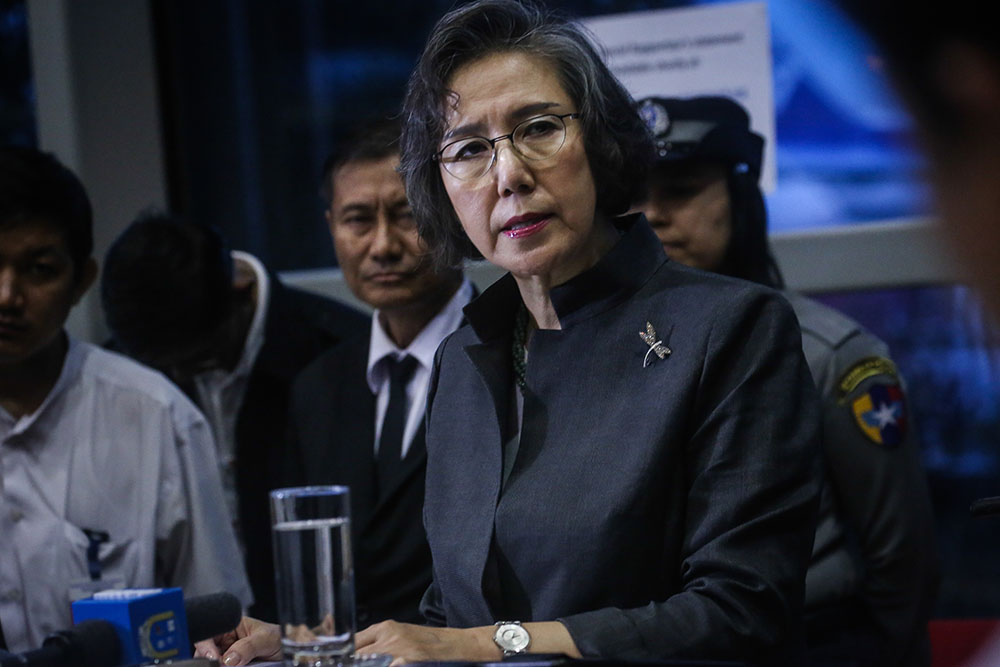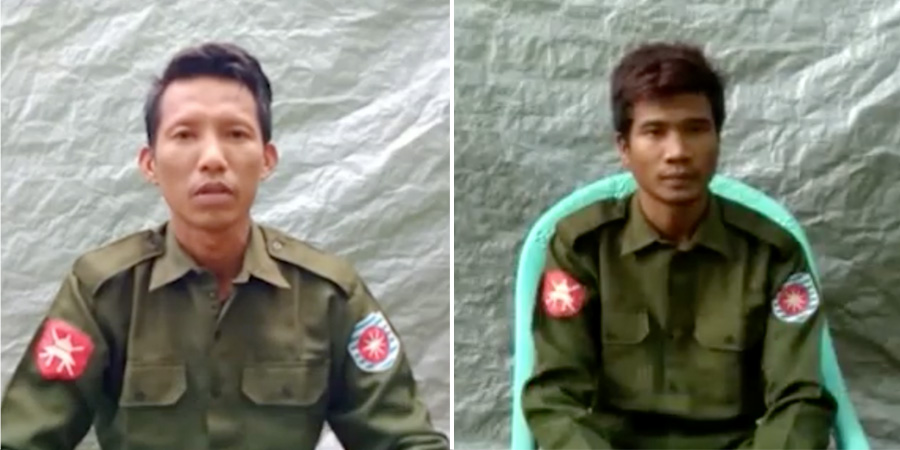Myanmar has a new UN special rapporteur on human rights: Thomas Andrews, a former member of the US House of Representatives from the first Congressional District of Maine.
He succeeds Yanghee Lee of South Korea, who, after initially being given access to Myanmar, was informed by the government in 2017 that she had been barred from returning to the country, as she had failed to demonstrate impartiality or objectivity in carrying out her work.
Andrews’ brief bio mentions that he is a senior adviser to the US-based human rights group Fortify Rights.
Recently, Andrews said his primary constituents are those whose human rights are under threat or under siege. He also pledged to engage with and listen to the government of Myanmar on issues of human rights.

Now that he is UN special rapporteur on Myanmar, his past and present affiliation with Fortify Rights will surely raise concerns.
It remains unclear whether he will be issued a visa to enter the country, but in any case, critics say Andrews will need to distance himself from Fortify Rights if he wishes to establish credibility as an impartial witness to events in Myanmar.
Why?
Last week, an article published in Asia Times rightly pointed out blunders in reporting by US media stalwart The New York Times and Fortify Rights, who published alleged testimony by two Myanmar soldiers who claimed to have committed murder and other atrocities against Rohingya people in Rakhine State in 2017, on their bosses’ orders.
Critics not only questioned the credibility of the Fortify reports, but also pointed out that the publicity potentially endangers the safety of the two soldiers, their family members and close friends and associates still in Myanmar, as they could be subject to reprisals, which would deter other potential witnesses to atrocities from coming forward.
According to the reports, the two soldiers are believed to be in The Hague—the location of the International Criminal Court.
But the soldiers are not, as the reports claim, deserters; rather, they are prisoners of war. In northern Rakhine, the Myanmar army engages in daily clashes with the Arakan Army (AA). The two soldiers mentioned in the reports are among many serving officers and troops who have been captured during the conflict. They did not desert their units.
Furthermore, there is a glaring omission in the story: How did the two captured soldiers get to The Hague? Were Bangladesh officials involved? Unconfirmed reports from Bangladesh suggest they were given Bangladeshi passports to facilitate travel to the Netherlands. If so, who stamped the Schengen visa in their passports? Who was involved in the operation? Did Fortify Rights play a role?
Foreigners who have been working on Myanmar issues for decades and independent critics say this is not the first time Fortify Rights has misconstrued the plight of refugees and victims. No wonder it has earned itself the moniker “Falsify Rights.”
In 2017, mobile phone footage of Myanmar soldiers beating men wearing civilian clothes in Shan State shocked social media followers. Fortify Rights claimed the footage had been taken in recent days or weeks, a claim repeated by The New York Times. However, it turned out the video was two years old.

The New York Times is not alone in falling prey to such groups’ falsehoods. And it would be unfair to single out Fortify Rights, as there are other birds of its feather. The Arakan Project comes to mind.
When the Thailand-based human rights group reported a massacre in Du Chee Yar Tan in northern Rakhine State in 2014, the Associated Press immediately bought into the claim. This publication followed suit. Not to be left behind, Fortify Rights days later jumped on the issue and used it as an opportunity to criticize the government.
The Myanmar government and President’s Office denied there was any evidence of a massacre.
The UN then demanded that Myanmar authorities investigate “credible information” about a reported massacre of more than 40 Rohingya Muslims in northern Rakhine State.
So far, no one has bothered to investigate the real story of what happened at Du Chee Yar Tan village.
Several independent sources including local human rights workers and independent researchers now say the Arakan Project, Fortify Rights and the UN made a huge mistake by repeating lies told to them by Muslim villagers.
There were clashes between police officers and local villagers, but no massacre took place. A conflict erupted between local residents and security forces following the disappearance of a police sergeant, who is presumed to be dead. But then Muslim villagers spread false information among the media and rights groups. There are many stories of similar episodes occurring elsewhere—each time, media and rights groups have failed to verify the accounts they are being told.
Working on the issue of the Rohingya is a worthy cause, but critics say their record of consistently playing fast and loose with the facts means rights groups like Fortify deserve closer scrutiny. Many go further, saying the group is willfully misconstruing reality in Myanmar in order to expand its funding base.
In Myanmar, we have grown used to a revolving door of UN envoys—of varying degrees of fitness—along with an unappetizing assortment of peace industrialists, carpetbaggers and gold diggers who arrive looking to exploit Myanmar’s plight in order to extend their CVs, before moving on to greener pastures. Their reputations are deservedly rotten, but they continue to unfairly tarnish Myanmar’s image.
If a poor image is the destiny of the country, so be it. But leave Myanmar alone to it.
Lastly, it cannot be ignored that the issue of funding is vital for a number of these organizations and individuals. In their world, greed and social media vanity trump the truth—and the Rohingya issue is a cash cow. But honestly, and sadly, some longtime observers now say that many rights groups preach accountability while giving themselves license to exaggerate, distort and repurpose reality to fit their Orientalist narratives.
In recent decades, countless stories have emerged of the military’s human rights violations against civilians, activists and political prisoners in Myanmar. The role of local and international media and human rights organizations is imperative in exposing and seeking accountability for these atrocities, and in deterring further abuses.
However, their reporting should be guided by the truth and abstain from exaggeration.
Once again, truth is the first casualty—and the perpetrators are still at large.
You may also like these stories:
UN Special Rapporteur for Myanmar Urges China, Russia to Join Calls for Accountability on Rohingya
Political Correctness and the Genocide Case Against Myanmar
Myanmar’s UN Ambassador Rejects Damning Rohingya Rights Report

















